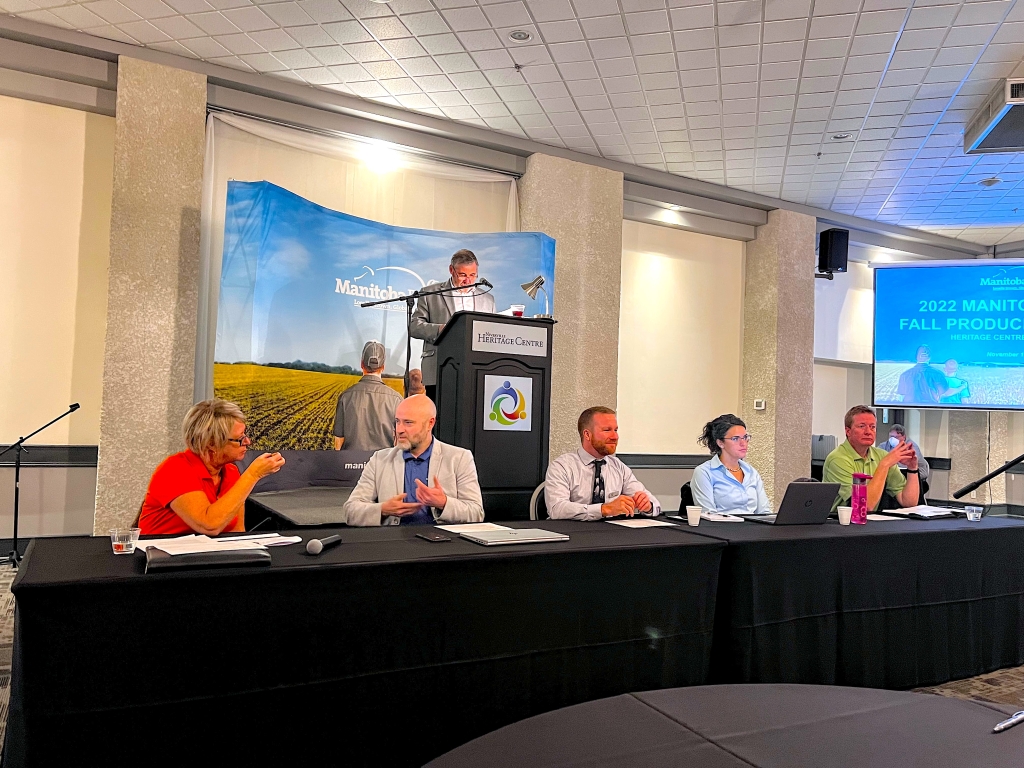
In November, Manitoba Pork general manager Cam Dahl led a boar pit discussion at the MPC district producer meetings. The five-panel members all staff members included Jenelle Hamblin, Mark Fynn, Susan Riese, Grant Melnychuk, and Jeff Clark, covering the following topics public trust pig trace pig safe pig care animal health and research.
Dahl said to update the app for the traceability PigTRACE program is to make it as easy as possible for people to use and input the data. The easiest way is to have an app that works across all smartphone platforms and updates with a new phone keeping it straightforward and easy to use.
Dahl said the Japanese regulator periodically comes to Manitoba to look at the traceability, food safety and animal welfare programs. The tour is quite in-depth including the CFIA labs and processing plants.
“It’s to certify that our system delivers what they expect.”
The scheduled visit for the end of November will also review the processes around zoning. For example, if African Swine Fever hits Canada the zoning process can divide the country into zones. “If ASF was to hit New Brunswick, for example, and we zoned Western Canada, Manitoba could still export pork to Japan. This audit is to verify that our systems do what they say we do with the rigour to deliver high-quality, safe food to Japan.”
Dahl said for this reason it is essential for ManPork to audit the pig farms, “To make sure that our food safety programs with standards set and developed by our industry based on the code of practice for the care and handling of pigs.”
MPC conducts these audits to ensure that the farmers on the program that carries the requirement to deliver pigs to federally inspected plants carry out their responsibilities as outlined in the program.
“Our customers like the Japanese, look and depend on them.”
Janelle Hamblin, the manager of swine health at Manitoba Pork talked about animal health and the future of the PED working group.
Hamblin said with the recent outbreak of PEDv among Manitoba pig facilities starting October 20 of 2021 a year with active PED cases. It seems to be a cycle every two years a significant outbreak, and that’s not sustainable.
The question arises, “Well, what do we have to do differently so that we start to break the cycle and get the disease under control?”
ManPork assembled representatives from across the industry including the veterinary community and the chief of staff from the chief veterinarian’s office around the table, HyLife Foods and Maple Leaf, and independent farmers all around the table. This group will examine what needs to happen to control this disease and the objectives.
“Everybody needs to be around the table because that’s one of the keys in controlling the disease, is to get buy-in from everyone. And that is a critical component. So, bringing the entire industry together to develop that long-term plan for controlling and eventually eradicating the disease.”
Public trust is a crucial component of food producers worldwide.
“How are you going to get there is a good point because this is a journey. I don’t think we’ll ever arrive at it, especially around questions like the environment, our environmental footprint, and animal welfare. The public is interested. And it returns to that question, where does my food come from?”
Dahl said any misperceptions in the public translate into misperceptions that move to policymakers and MPs and MLAs, who may come up with regulations not based on reality or science.
“It’s incumbent on us to have those conversations with the public and with elected officials, policymakers, to get out what we’re doing in terms of environment and animal care.”
Also, be bold in focusing on the third leg in this stool financial stability and long-term sustainability for the industry. Finally, the pig industry must talk about the economic impact on the Manitoba economy and the jobs.
“If we can have those conversations, we stand a much better chance that when policymakers and elected officials look at regulation and legislation, they will consider farmers’ needs and concerns.” •
— By Harry Siemens






